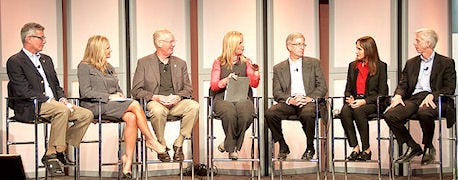February 11, 2015

Last month, a panel of dairy farmers, processors and stakeholders at the International Dairy Foods Association Dairy Forum agreed that the millennial audience is voicing ideas to drive animal welfare practices across the food chain.
Related: Food Dialogues: Who's Shaping America's Eating Habits?
The U.S. Farmers & Ranchers Alliance hosted the Food Dialogues event, moderated by journalist Elizabeth Leamy. The panel, "Animal Care and Consumers' Emerging Expectations," was the 26th installment of USFRA's signature panel series.

The Food Dialogues: Dairy Forum brought together consumers, farmers, ranchers, industry experts, scientists and media to examine and discuss tools and strategies that are used by farmers, ranchers and veterinarians to promote animal health and promote a safe food supply. (photo credit: Kenneth Appelbaum)
A portion of the discussion focused on the responsibility that everyone across the food chain has when it comes to animal care. As Dr. Marcia Endres, D.V.M., Ph.D., professor of dairy science at the University of Minnesota explained, "When humans domesticated animals, they entered into a contract to provide food, water, shelter and protection – to provide them a good life."
Robin R. Ganzert, Ph.D., president and CEO of the American Humane Association expanded on what a "good life" means and explained that humans' contract with animals provides five essential freedoms: freedom from pain and suffering; freedom from fear; freedom from discomfort; freedom from hunger and thirst; and the ability for animals to express their natural behaviors.
The conversation also focused on panelists' opinions on transparency, and the use of undercover videos. Jim Mulhern, president and CEO of the National Milk Producers Federation, said the examples shown on video are an aberration in the way farmers and ranchers across the United States treat their animals. "Does it happen? Yes, and it's a crime. We as an industry condemn these actions and that's why we have a program to address animal care."
Mike Reidy, senior vice president of corporate affairs, Leprino Foods Company, whose company has first-hand experience with animal activists using undercover videos, stressed that there is a dramatic need to over communicate. "You can't communicate after an event happens. We need to have the conversation in advance." His company is committed to leading the industry in consistent consumer-facing communication activities and spoke about how they have improved its animal care program.
Related: Food Dialogues: Consumers demand appropriate farm animal care
"We as an industry are proud of what we do," added Chuck Ahlem, dairy farmer, Hilmar Jerseys, Hilmar, Calif. who highlighted some of the innovative technologies his farm is using to make his dairy cows more comfortable, such as the use of water beds. "We have a responsibility to communicate to consumers about what we do. Dairymen are proud of the hard work they do and the care of their animals."
USFRA Board Chairwoman Nancy Kavazanjian said the Food Dialogues events can be likened to the discussions that might be had around the dinner table.
"Like a lot of topics when you sit down at the dinner table, you're not always going to agree on everything, but we need to be open-minded and respectful of other people's opinions. The same holds true for our Food Dialogues," she said.
For a recap of the Food Dialogues: Animal Care and Consumers' Emerging Expectations panel, see Farm Progress coverage: Food Dialogues: Consumers demand appropriate farm animal care
You May Also Like




